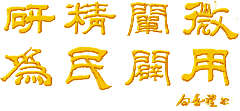



时 间: 2023年6月2日(星期五) 上午10:00
地 点: 新楼第六会议室(三层F310)
主 持 人: 赵宇亮 院士
报告题目: Unexpected Applications of Cationic Biomaterials
报 告 人:Prof. Kam W. Leong
Samuel Y Sheng Professor
Department of Biomedical Engineering
Columbia University, New York, NY 10032
摘要:
Inflammation plays an important role in responding to danger signals arising from damage to our body and in restoring homeostasis. Controlling the inflammatory response is a major strategy in managing diseases such as cancer, autoimmunity, and wound healing. While conventional drug therapies are the norm in tackling inflammation, biomaterials are increasingly proposed to join the battle. Through drug delivery strategies, biomaterials potentiate the efficacy of anti-inflammatory drugs by improving bioavailability and diminishing side effects. Applied in inhibitory or scavenging strategies, they reduce inflammation by removing the pro-inflammatory factors. For instance, the scavenging approach may be applied to inflammatory diseases such as rheumatoid arthritis, psoriasis, multiple sclerosis and systemic lupus erythematosus, which are increasingly linked to inappropriate and chronic activation of inflammatory cells. A central event in the pathogenesis of these diseases appears to be an aberrant activation of innate immune sensors, most prominently the Pattern Recognition Receptors (PRRs), by nucleic acids that are released from dead and dying cells. In this presentation, I will discuss the application of nucleic acid-binding polymers as a molecular strategy to combat inflammation and as a therapeutic carrier for drug therapy.
简介: